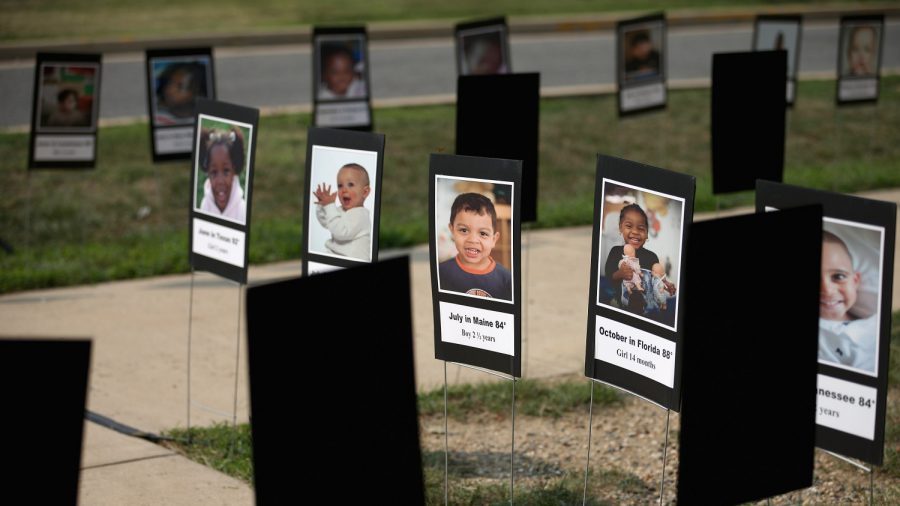Sophie Rayne “Ray Ray” Cavaliero died of a vehicular heatstroke at the age of 1. Her mother now devotes her life to preventing hot-car fatalities.
“This too can happen to you”
Seven years after her baby died from vehicular heatstroke, Kristie Reeves still dedicates her life to preventing hot car fatalities. pic.twitter.com/s9ZTqIvEBn
— ABC News (@ABC) May 26, 2019
The father of the baby, Brett Cavaliero, forgot to drop off Ray Ray at daycare on his way to work, ultimately leaving her in the Texas heat on May 25, 2011, according to ABC News. Thirty-three children died in hot cars that year, San Jose State University reported.
28 cases of pediatric vehicular heatstroke death have been confirmed by 7/19. That’s a U.S. record for the date — one that nobody wants to own. Learn more: https://t.co/22jDKIWgkA @NHTSAgov @safekids @NSCsafety @ScaryMommy @HuffPostParents #KeepEachOtherSafe pic.twitter.com/hHakGlzgvi
— NCPSB (@NCPSB) July 23, 2018
“Especially this time of year, every summer is particularly hard,” Ray Ray’s mother, Kristie Reeves, told ABC News. “Some days are not so horrific, but the angel day, birthday, Mother’s Day are always difficult. I tend to take that time off for extra counseling, therapy, and meditation to live through it because it’s like it just happened.”
Although Reeves is hurt, she is on a mission to save lives, and she does that by being part of the Texas Heatstroke Task Force (pdf), according to the broadcast network. The task force partners with Safe Kids Worldwide, educating people on and advocating for heatstroke prevention.
Reeves also started Ray Ray’s Pledge: “a program aimed at providing a safety net surrounding the morning drop-off at daycare.”
Create reminders to prevent vehicular #heatstroke bc #heatstrokekills! pic.twitter.com/FLyD4kVzG4
— Ray Ray’s Pledge (@rayrayspledge) July 3, 2017
According to the program, the morning drop-off at daycare is a high-risk time for vehicular heatstroke. The program stresses the importance of communication between parents and daycare teachers.
Ray Ray’s Law is Passed
Known as “Ray Ray’s Law,” HB2574 was proposed by Reeves’s organization, and passed in 2015. The law requires hospitals in Texas to educate parents on vehicular heatstroke, sudden infant death syndrome, and other health-related topics.
“Not once was I ever told about this danger to child passenger safety,” Reeves told ABC News. “If you had asked me the day before May 24 [2011], I would have assumed it was very bad parents and parents who used the car as a babysitter. In these times when these children are forgotten, the most common factor was a change in routine.”
On the day of Ray Ray’s death, her father broke his usual route, and took a different turn. Reeves believes was the cause of his forgetfulness was Forgotten Baby Syndrome.
More from Dr. David Diamond on “Forgotten Baby Syndrome” #Dateline pic.twitter.com/Ya3JoQNjkX
— Dateline NBC (@DatelineNBC) January 28, 2017
A professor of psychology, molecular pharmacology and physiology at the University of South Florida has studied the syndrome since 2004.
“It’s where the parent completely loses awareness that the child is in the car,” Professor David Diamond told ABC News. “It’s our brain habit system. It allows you to do things without thinking about it. That plan we have to stop a habit seems to get suppressed. We lose awareness of our plan to interrupt that habit. These different brain systems actually compete against each other.”
Competition between the “habit memory system” and the “prospective memory system” can lead to Forgotten Baby Syndrome, Diamond explained to ABC News.
Playing It Safe
The couple now has a set of girls: twins, and both five years old, according to the broadcast network. Reeves said they make sure the girls arrive safely wherever they need to be, by contacting the person transporting them.
Dikirim oleh Kristie C Reeves-cavaliero pada Minggu, 21 April 2019
Teachers also call Reeves whenever the girls aren’t in school.
Reeves said she supports the Hot Cars Act, which was introduced in 2017. The act would make it a requirement for new vehicles weighing less than 10,000 pounds to include an alert system that would notify the driver—with both sound and vibration—to check the backseat.


